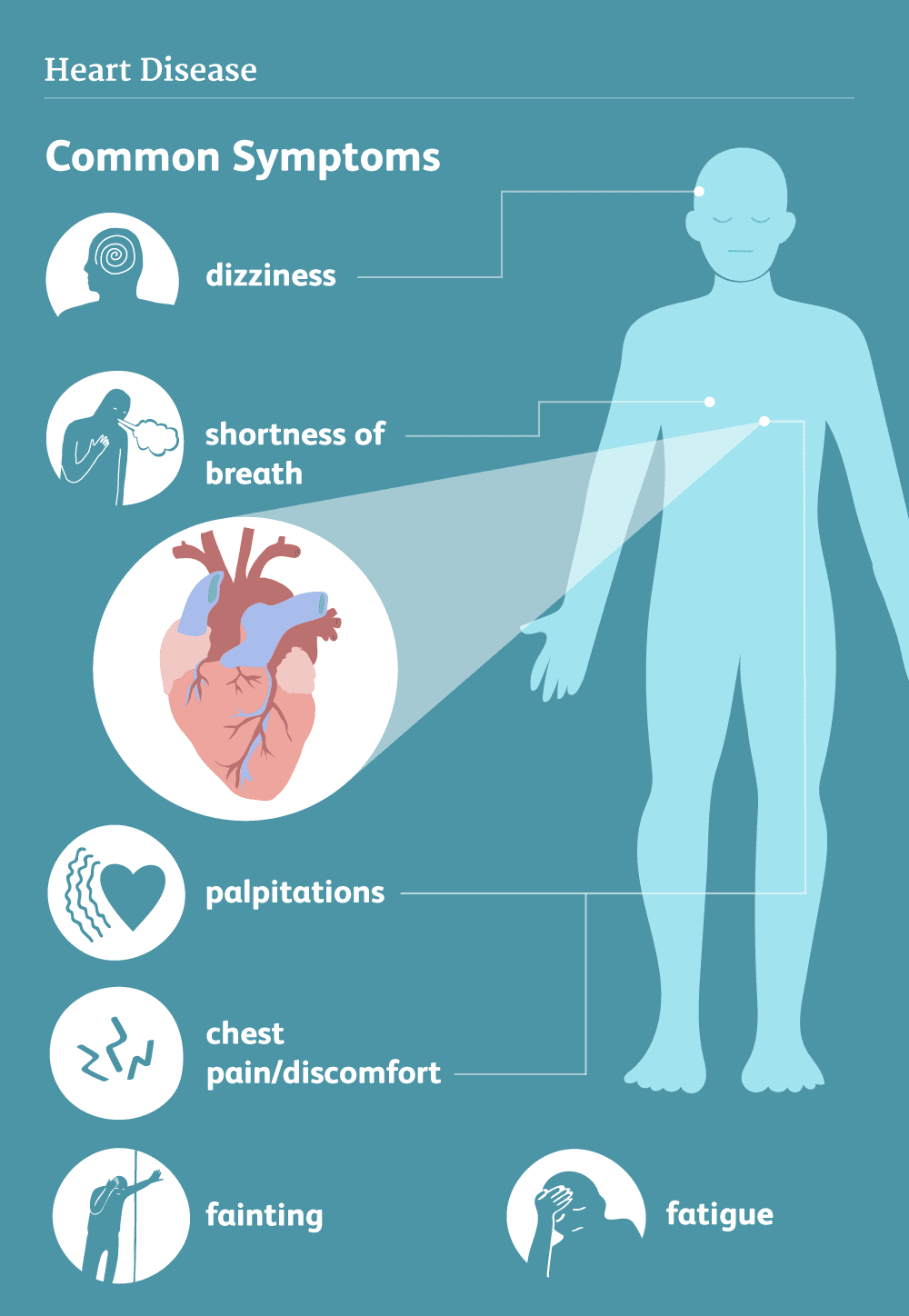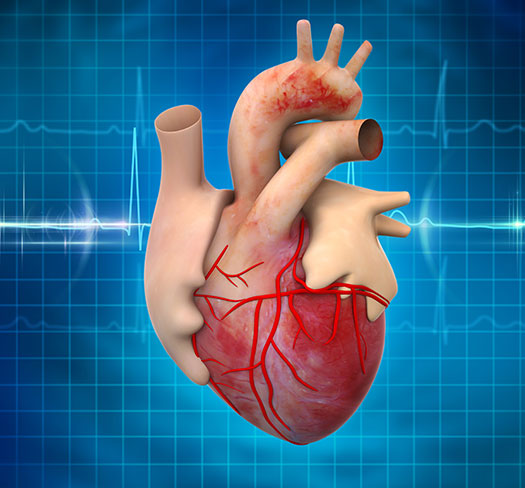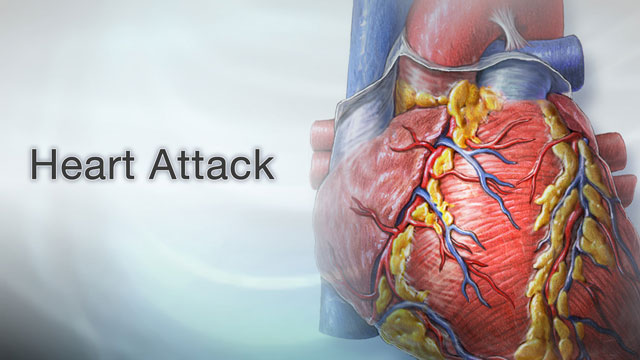INTRODUCTION
A heart attack, also known as a myocardial infarction, occurs when the flow of oxygen-rich blood to a part of the heart muscle is blocked for a long enough period that part of the heart muscle is damaged or dies. This blockage is typically caused by a build-up of fatty deposits, known as plaques, in the coronary arteries. These plaques can rupture and form a blood clot that obstructs the blood flow.

COMMON SYMPTOMS
Common symptoms of a heart attack include:
- Chest pain or discomfort, which may feel like pressure, squeezing, or fullness
- Pain or discomfort in other areas of the upper body, including the arms, back, neck, jaw, or stomach
- Shortness of breath
- Nausea or vomiting
- Lightheadedness or fainting
WARNING SIGNS OF HEART ATTACK
Don’t wait to get help if you experience any heart attack warning signs. Some heart attacks are sudden and intense, but others start slowly, with mild pain or discomfort. Pay attention to your body and call 911 if you experience:
- Chest discomfort. Most heart attacks involve discomfort in the center of the chest that lasts more than a few minutes – or it may go away and then return. It can feel like uncomfortable pressure, squeezing, fullness or pain.
- Discomfort in other areas of the upper body. Symptoms can include pain or discomfort in one or both arms, the back, neck, jaw or stomach.
- Shortness of breath. This can occur with or without chest discomfort.
- Other signs. Other possible signs include breaking out in a cold sweat, nausea or lightheadedness.
RISK FACTORS
Several risk factors can increase the likelihood of experiencing a heart attack. They can be broadly categorized into modifiable and non-modifiable risk factor
Non-Modifiable Risk Factors:
- Age: Risk increases with age, especially for men over 45 and women over 55.
- Gender: Men generally have a higher risk at a younger age, though the risk for women increases and can become higher than that for men after menopause.
Family History: A family history of heart disease can increase your risk, particularly if a close relative had a heart attack at an early age.

Modifiable Risk Factors:
- High Blood Pressure (Hypertension): Persistent high blood pressure can damage the arteries, making them more susceptible to plaque buildup.
- High Cholesterol Levels: Elevated levels of LDL (bad cholesterol) and low levels of HDL (good cholesterol) can contribute to plaque formation in the arteries.
- Smoking: Tobacco use can damage the lining of the arteries, leading to plaque buildup and narrowing of the arteries.
- Diabetes: Poorly controlled diabetes increases the risk of heart disease by contributing to higher blood sugar levels, which can damage blood vessels.
- Obesity: Excess body weight often contributes to high blood pressure, high cholesterol levels, and diabetes, all of which are risk factors for heart disease.
- Physical Inactivity: Lack of exercise contributes to obesity, high blood pressure, and high cholesterol, increasing heart attack risk.
- Unhealthy Diet: A diet high in saturated fats, trans fats, cholesterol, and sodium can contribute to the development of heart disease.
- Excessive Alcohol Consumption: Drinking too much alcohol can increase blood pressure and contribute to weight gain.
- Chronic Stress: Prolonged stress can lead to unhealthy behaviors and physiological responses that increase heart disease risk.
PREVENTION
Preventing a heart attack involves adopting a heart-healthy lifestyle and managing risk factors effectively. Here are some key strategies to help reduce your risk:
1. Maintain a Healthy Diet
- Eat a Balanced Diet: Focus on fruits, vegetables, whole grains, lean proteins, and healthy fats.
- Limit Saturated and Trans Fats: Reduce intake of high-fat dairy products, fatty cuts of meat, and processed foods.
- Reduce Sodium: Lower salt intake to help manage blood pressure.
- Increase Omega-3 Fatty Acids: Consume sources like fatty fish (e.g., salmon, mackerel) or consider a supplement if recommended by your doctor.
2. Exercise Regularly
- Aim for at Least 150 Minutes: Engage in moderate-intensity aerobic activity each week, such as brisk walking, cycling, or swimming.
- Incorporate Strength Training: Include muscle-strengthening activities at least twice a week.
3. Manage Weight
- Maintain a Healthy Weight: Losing excess weight can help reduce blood pressure, cholesterol levels, and the risk of diabetes.
- Adopt a Sustainable Approach: Combine a balanced diet with regular exercise for effective weight management.

4. Quit Smoking
- Seek Support: Use resources like counseling, nicotine replacement therapy, or medications if needed to quit smoking.
- Avoid Secondhand Smoke: Stay away from environments where others are smoking.
5. Limit Alcohol Consumption
Follow Guidelines: For men, limit alcohol to no more than two drinks per day, and for women, no more than one drink per day.
6. Manage Stress
- Practice Relaxation Techniques: Engage in activities such as meditation, deep breathing exercises, or yoga.
- Find Support: Talk to friends, family, or a mental health professional if you’re feeling overwhelmed.
7. Monitor and Manage Health Conditions
- Check Blood Pressure Regularly: Keep your blood pressure within the recommended range.
- Control Cholesterol Levels: Follow your healthcare provider’s recommendations for managing cholesterol.
- Manage Diabetes: If you have diabetes, work with your healthcare provider to keep your blood sugar levels under control.
8. Get Regular Check-Ups
- Schedule Routine Appointments: Regular check-ups with your healthcare provider can help monitor your risk factors and make adjustments to your prevention plan as needed.
9. Take Medications as Prescribed
- Follow Medical Advice: If your doctor prescribes medication to manage blood pressure, cholesterol, or other risk factors, take it as directed.
MEDICATION
Herbal medications can be a complementary approach to managing heart health, but they should be used with caution and ideally under the guidance of a healthcare professional. Here are some herbs and natural supplements that are often discussed in the context of heart health:
1. Garlic
- Benefits: Garlic is known for its potential to lower blood pressure and cholesterol levels, which can help reduce heart disease risk.
- Forms: Fresh garlic, garlic supplements, or garlic powder.
2. Hawthorn
- Benefits: Often used to improve heart function, hawthorn may help with symptoms of heart failure and angina by improving blood flow and reducing blood pressure.
- Forms: Capsules, tablets, extracts, or teas.
3. Fish Oil
- Benefits: Fish oil can help reduce triglycerides, lower blood pressure, and decrease the risk of arrhythmias.
- Forms: Liquid supplements.
4. Turmeric
- Benefits: Turmeric, the active ingredient in turmeric, has anti-inflammatory properties that may benefit heart health by reducing inflammation.
- Forms: Powder, capsules, or as part of a diet.
5. Green Tea
- Benefits: Green tea is rich in antioxidants, particularly catechins, which may help lower LDL cholesterol and improve overall heart health.
- Forms: Brewed tea or supplements.
6. Ginger
- Benefits: Ginger may help reduce blood pressure and cholesterol levels, and has anti-inflammatory properties.
- Forms: Fresh ginger, ginger tea, or supplements.
7. Cinnamon
- Benefits: Some studies suggest that cinnamon can help lower blood sugar levels and cholesterol, although more research is needed.
- Forms: Ground cinnamon, supplements, or as part of the diet.
Considerations and Precautions:
- Consult a Healthcare Provider: Always consult your healthcare provider before starting any herbal supplements, especially if you are taking medications or have existing health conditions.
- Potential Interactions: Herbs can interact with medications and other supplements, potentially altering their effectiveness or causing side effects.
- Quality Control: Choose high-quality supplements from reputable sources to avoid contaminants or ineffective products.
This Article is for Basic Information. Contact a professional doctor before using it.
HAKEEM KARAMAT ULLAH
+923090560000





Very informative articles